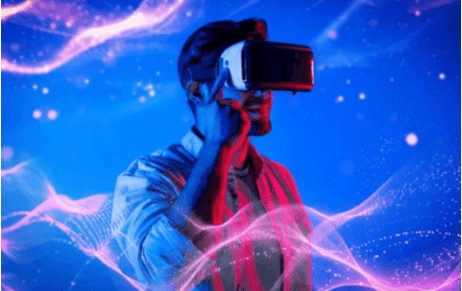INTRODUCTION Being applicable in many ways virtual reality or VR has now revolutionized several industries…
Implications of Acts Committed In Virtual Reality: A Legal Analysis
Introduction
On February 6th, 2022, exactly two years ago, Mr. Dinesh S.P. and Ms. Janaganandhini Ramaswamy became the first ever couple to celebrate their wedding reception on Metaverse. Although, there is no conclusive meaning of to the term ‘Metaverse’, it is commonly known as the
Both Dinesh, who at the time was a software developer, and Janaganandhini, who was an engineer, were devoted fans of the novel and movie series ‘Harry Potter’. As a result, the wedding reception held in Metaverse was Harry Potter themed, wherein the venue was Hogwarts, the school of witchcraft and wizardry, and the avatars of people had the appearances similar to the characters from the series. This was done with the help of Tardiverse, a company specialising in mixed virtuality reality architecture.
This event was celebrated nationally, not only for being the first of its kind, but also for the aspect of accessibility for the friends and family of the couple who lived abroad, saving on costs of labour, food, décor, etc. However, such virtual interaction is not one previously unseen.
Long before the inception of metaverse, the game called “Second Life” was launched, which functioned in a manner largely similar to the Metaverse. It allowed the players to draw characters who looked and dresses like them, or the way they chose, had habits and accessories of their choice, and could choose to interact with and conduct activities together with other players from around the world. They could drive, go to institutions, visit mini arcade within the game, etc. However, little attention was paid to the legal aspects of such virtual interactions.
Questions Arising
One could debate that such virtual gatherings and interactions in Metaverse serve as a similar source of pleasure to that of a real life, physical interaction. At the very least, they fulfil the obligations, or formalities as needed. The question then arises, should these virtual gathering and interactions be subjected to similar regulations as those in real life?
It must be understood that the events that occur within the metaverse have an impact outside of it too. Taking the example of the wedding in Tamil Nadu, the greetings given to the couple had the impact similar to a phone call, if not more. The presents given through NFTs served as real life virtual presents. Does this mean that an act defaming another person would be equally unacceptable in real life? The effect on the individual who gets subjected to this would certainly be equally bad. Would the murder of a character be considered a crime, despite the possibility of revival or re-creation of the character?

In both Metaverse, depending upon in which context and what features its being used, and in the game of Second Life, players have the option to indulge in several activities. These activities included the creation of art. However, in a world where the characters can be killed and revived, or a human being can have multiple identities at the same time, to what extent do the ownership rights over such property sustain?
There are games, such as GTA – 5 and Second Life which allow you to buy virtual property with real-world money, and have possession of the same over it in the virtual world. The same can then be used to enjoy the virtual world to a greater extent. But, can the theft of such property, within the virtual world, can hold an individual responsible for the same in the physical world? Although the Art has been created within a supposed “game”, how is it any less claimable than that created over a social media post. Both of them have a virtual nature, presence and identity. As the usage of Metaverse is on the rise, sooner or later such mishaps, and questions of liability are inevitably bound to arise.
Conclusion and Way Forward
As with all other changes in the societal affairs, the advent of the metaverse, and online interactive gaming world, necessitates the need for regulation. Although cases of defamation and intellectual property theft may not have occurred within the metaverse till date, the rising popularity of the same is bound to lead to incidents of violation of the right to enjoy a digital presence peacefully. A regulatory framework, which facilitates the imposition of accountability on those violating the digital rights of the netizens of such virtual spaces, and committing digital crimes, which are more than likely to have an external presence. Without such legislations, the interactive virtual reality becomes a loophole for those willing to cause harm to the vulnerable.
Author : Aayush Tiwari, in case of any queries please contact/write back to us via email to chhavi@khuranaandkhurana.com or at IIPRD.
References
- NDTV, 2022. Retrieved from https://www.ndtv.com/offbeat/metaverse-wedding-inside-a-tamil-nadu-couples-wedding-reception-in-metaverse-2753509.
- The Guardian, 2023. Retrieved from https://www.theguardian.com/technology/2023/jun/10/who-needs-the-metaverse-meet-the-people-still-living-on-second-life.
- NBC News, 2007. Retrieved from https://www.nbcnews.com/id/wbna17538999.
- McKinsey and Company, 2023. Retrieved from https://www.mckinsey.com/featured-insights/in-the-balance/the-role-of-legal-and-compliance-in-the-metaverse.
- Johann Hartleben, International Bar Association, 2023. Retrieved from https://www.ibanet.org/conference-report-metaverse-legal-issues.
- Rahul Hingmire, Forbes India, 2022. Retrieved from https://www.forbesindia.com/blog/legalese/the-metaverse-and-legal-frameworks-around-it/.

